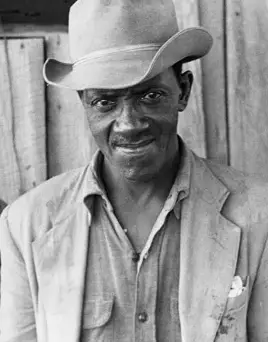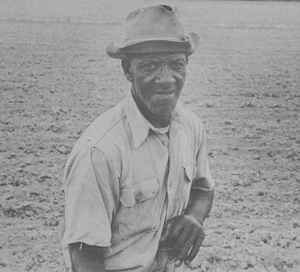
by: John Allan Clark
When I first came across the name Horace Sprott, it wasn’t on a monument on the courthouse square or a historic marker out on Highway 14 east, although maybe it should have been. I wouldn’t have known his name if it hadn’t been for a YouTube playlist. Which is a shame, considering he was born, and spent most of his life, just a few miles from the place where I’ve spent most of mine.
Sprott never got what you’d call famous, but in certain circles, particularly among folks serious about American folk music in the 20th century, he was something of a legend. A self-taught singer and song archivist who learned to work without instrumental accompaniment and without books, Sprott had amassed in his life an encyclopedia of music, all in his head, all ready at a moment’s notice.
The people who found him had come to the Black Belt hoping to recreate the earlier success found in the Mississippi Delta by folklorists and record producers John and Allan Lomax, where they met and recorded legendary figures like Leadbelly and Muddy Waters for the first time, shortly before they became household names.
John Lomax had himself written Alabama off as a “musical wasteland” for many years, passing over our region and denying who knows how many other Leadbellys a chance to be heard. It wasn’t until after the Delta had been thoroughly investigated that people—including John Lomax, who must have felt he was eating his words about that whole “wasteland” thing when he first heard Vera Hall sing in Sumter County—began to take a second look at Alabama and go hunting for our musical heritage.

They were, of course, looking for the blues, but even as early as the 1950s in the rural South, the blues they were looking for was a dying medium. Anyone young and talented enough to make a go of it had left for the cities in the North, making real money for the first time in their lives, taking full advantage of the electric guitars and souped-up amplifiers this new life gave them access to, and re-imagining the sound of American music in the process.
In other words, the music-hunters found themselves coming up short. They’d shown up twenty years too late to tap into the goldmine they were hoping for. In Perry County, if they had been hoping to uncover some lone old fellow in a field with a bottle of wine, playing slide guitar across his lap with a pocketknife and singing about tuberculosis and boll weevils, they would have again found themselves disappointed.
It’s a lesson, I suppose, in how we can get so blinded looking for the things we expected to find that we miss what’s right in front of us.
In Horace Sprott, they instead found something rarer: a singer and storyteller who defied genre, who collected his songs over the course of a life and kept them all in his head, next to stories about his mother, about lost loves, about the jobs he had and the people he had known. The songs and the stories, on those old recordings, seem to intertwine: touchstones in the life of one man born around the turn of the last century in Sprott, Alabama. On its surface, it looks like such a simple thing: a man knew some songs and he sang them for people, or sometimes just for himself. But looks, we know, can be deceiving. How many people do you know who can reel off dozens—a hundred? more?—of whole songs, from memory, at the drop of a hat? That’s a depth of ability far beyond what most of us are capable of.
Sprott wasn’t a bluesman, because he was more than that. He knew the songs the music hunters wanted to hear, of course. He knew the music that had come before it, the kind people played and sang around the countryside when he was growing up in Perry County. Just the same, he knew the new songs he was hearing on the radio. He knew gospel songs learned from his mother and grandmother. Story songs like Stagger Lee. He knew songs he had heard once, decades ago, sung to him just the way he would later sing them for us: from memory, no accompaniment, no excuses.
He even knew some he had written himself, though sadly he didn’t sing those as much.
I know I’ve said a couple of times that he sang without accompaniment. I should note here that that’s not strictly true. He played harmonica, although from the recordings that exist of his performances he didn’t play it often. You have to imagine he didn’t always have one, and had to learn to be just as comfortable performing with it as without. By that same token, his accounts of his travels outside Perry County indicate that when he moved around looking for work, he mostly traveled alone. He never had a “band,” as such, particularly not when he was working jobs throughout the South as a young man, the time when he learned and perfected the bulk of his repertoire. But when he came back home, to Perry County, he had friends who would come play and contribute vocals of their own. Three of those friends, Mozell Moore Sr., Phillip Ramsey Sr., and Phillip Ramsey, Jr., were part of one of Sprott’s later recording sessions. So their work, too, was recorded for future generations. Even though almost no one here knows about it.
I once spotted Mozell Moore Jr. in a restaurant in Marion, not long after I’d first heard the Horace Sprott records. I asked if I could play him something, pulled out my phone, and cued up one of the recordings that featured his father (who, like Sprott, played harmonica). He’d never heard it before. Never knew it existed. And before that day he hadn’t his father’s voice, he told me, since he died years ago. So for the next two and a half minutes it played, and we sat in a booth at Whillard’s waiting on our food, listening in on a moment in time from another time. A song doing the thing Horace Sprott’s songs did: communicating, without having to come right out and say it, what that moment in time was like.
In 1957, on CBS, prime time, Horace Sprott stood in front of the television viewers of this country and sang them his songs. It was part of a special episode of the network’s news magazine show of the day, Omnibus. The episode was titled, “They Took a Blue Note,” and it featured Frederic Ramsey, one of the music-hunters who had brought Sprott to national attention. The cameras came to him, to his little farm near Suttle in Perry County, Alabama. He sang some songs. He played some harmonica. And then, according to musician and music historian Ry Cooder, a turn even more surreal unexpected followed:
“You’re out there and there’s Horace Sprott…playing the harmonica and plowing the field…[then] all of a sudden, around the corner come five guys behind a barn, and they have these beat-up horns. They stand up and play this stuff, and you just fall on your knees. I’m telling you, you will have a transcendent experience, because it’s right in front of your face. It’s a thing that you can barely believe, but it’s one of the great documents of pure soul. These guys are field hands in the 1950s, they’re all middle-aged men, hard-working guys, and they play these horns in some crazy way. The sound that comes out is utterly mind-boggling. It’s just too good.”
How I wish I knew the names of all the folks in that band. Like Sprott and his accompanists whose names are recorded in history, they doubless have descendants living in Perry County right now. Children or grandchildren may never have even known about Granddaddy’s past as a musician. To many people raised back in the old days, in the country, by people with strict interpretations of what other people ought to do and ought not to, being a musician meant you were out at night entertaining a bunch of folks who were probably drinking, carrying on, and getting into trouble they had no business being into. Not too different from today, really. Not a life for respectable people. Something to put away and leave once you grew up and developed a sense of propriety.
Not that Sprott ever did. Put it away, that is. Music was with him all his life, into his old age, and he was old before anybody outside of his little corner of Alabama ever paid him any mind for it. No doubt he would have kept singing those songs no matter who stopped to listen, or didn’t. In the recordings of him that exist, it’s obvious: this is a deeply personal thing for him. He sang because he was a singer. Notwithstanding the different jobs by which he earned his living over the years, a singer was what he was.
There’s something else about many of Sprott’s old recordings, too. It’s not just the human accompaniment that stands out.
There’s the constant, melodious, uninterrupted chirping of thousands of crickets going on in the background for at least one entire recording session he did, punctuated by the occasional dog barking or whippoorwill calling in the distance. It sounds like a summer night still does here, if you can find a quiet enough spot.
There are a few seconds, before he starts to sing and after he finishes, or when he pauses and takes a breath, when all you can hear are those summer night sounds. Listen sometime, and you’ll hear what I mean: No sound engineer, no matter how skilled, not with all the technology we have available today to do this sort of thing, could take those background noises out and have those songs sound the way they should. Horace Sprott would have been singing with those crickets all his life, at that point. They were part of the music, too. I remember thinking, when I heard these recordings for the first time, that when I listen on a quiet night, I’m hearing the great-great-great-great grandchildren of those crickets and whippoorwills, singing their same songs.
The week before Sprott’s television debut, in the January 17 1957 edition, Greensboro Watchman editor Hamner Cobbs re-published an article about the Frederic Ramsey-produced episode of CBS’s Omnibus that was to air later that week. The article was a review of the show from the New Yorker magazine. In an editor’s note Cobbs added, “[Ramsey], the jazz historian, made Greensboro his headquarters when he was in the Black Belt two years ago.” So he must have visited other spots around our community and heard other songs and singers, as well. If only there were more tapes—and perhaps, somewhere, there are.
I’ve tried to find video of that old television performance myself, going as far as to contact CBS, but I have, like those music hunters from nearly three quarters of century ago, found myself coming up short. It must be out there still on a shelf somewhere, like Horace Sprott on the farm near Suttle, minding his own business, holding all those songs inside, waiting for someone to come along and ask to hear them again.
